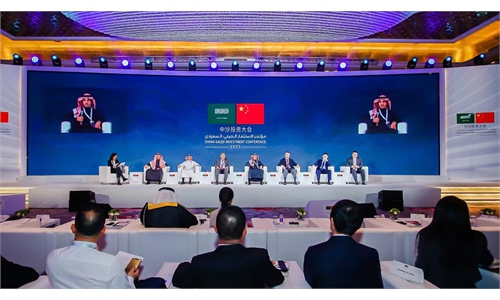
A view of Shanghai Photo: VCG
Middle East fund managers are showing their growing appetite for Chinese assets this year, increasing holdings in Chinese A-share stocks, adding strategic investment in Chinese companies, and expanding presence by setting up new branch offices in China.
Since the beginning of the year, investors from the Middle East region are betting on the Chinese market. Investment experts said that more overseas funds will flow to the yuan-denominated assets in 2024.
As one of the latest examples, the Saudi Public Investment Fund (PIF), one of the world's largest sovereign wealth funds managing nearly $700 billion, has announced plans to set up an office in the Chinese mainland, media reports said, citing the fund's governor Yasir Al-Rumayyan.
Chinese new-energy vehicle (NEV) maker NIO Inc on Monday revealed that it received $2.2 billion strategic equity investment from CYVN Holdings, an investment vehicle based in Abu Dhabi.
NIO in July received a $738.5 million investment from CYVN. "Following the completion of the December Investment Transaction, CYVN will beneficially own approximately 20.1 percent of the company's total issued and outstanding shares," NIO said in a statement.
The above-mentioned financing are just two latest instances of increased investments by Middle East capital in China during the past year. In fact, the scope of their investment activities in Chinese market spans a much broader spectrum of industrial sectors.
Investment spree
Middle Eastern companies have conducted intensive researches in Beijing, Shanghai, Guangzhou, Suzhou and Changsha. And they continue to allocate funds into sectors like new energies, advanced manufacturing, life science and other fields across the primary and secondary markets, according to media reports.
In the third quarter, the A-share holdings of Abu Dhabi Investment Authority (ADIA), the leading sovereign wealth fund in the Middle East, increased by 2.1 billion yuan ($294 million) compared to the second quarter.
Additionally, institutions such as the ADIA, Kuwait Investment Authority, Saudi PIF, and Qatar Investment Authority have collectively undertaken more than 20 investment projects in China, according to media reports.
A research report from Industrial Securities in China noted that the proportion of investments in Chinese assets within the equity asset portfolio of ADIA has increased from 4.5 percent at the end of 2019 to 22.9 percent in the first quarter of 2023.
And, Kuwait Investment Authority has seen a nearly 50-fold increase in investments in China over the past 15 years, making China as the second largest destination within its global investment portfolio.
Sovereign wealth funds in the Middle East currently have assets under management of around $4 trillion - and this is expected to expand to $10 trillion by 2030, Nicolas Aguzin, CEO of the Hong Kong Exchanges and Clearing, wrote in a blog.
"These funds are looking for returns and diversification opportunities and, when combined with the growing levels of interest in international markets from onshore investors in China - a key part of what I call the Big Bang of Finance - the combined power of capital pools in China and the Middle East have colossal potential to propel the next phase of global growth," Aguzin said.
Growing opportunities
While Middle East investment has been looking to rising opportunities in China, it is not the sole foreign financial institution actively positioning itself in this market, defying the baseless hype or sinister narrative adopted by some Western media outlets that "foreign investors are fleeing the Chinese market."
The US asset management giant Blackstone's Chinese branch has recently expanded its offices in Shanghai, a move viewed by the market as a signal to increase investment in Chinese market.
London-based quantitative hedge fund Aspect Capital, which oversees more than $8 billion in asset, will soon apply to qualify to set up a branch outlet in the Chinese mainland for onshore fundraising and offering its products, Reuters reported on December 13, citing anonymous sources.
Currently, Chinese assets, including A-share equities, Hong Kong stocks, Chinese stocks listing in the US, and Chinese bonds and securities, as well as the Chinese currency yuan, are largely undervalued. It is an opportune time for increasing investment, and the decision by these foreign financial institutions to increase their exposure to Chinese market at the current juncture is undoubtedly a wise choice, Yang Delong, chief economist at Shenzhen-based First Seafront Fund Management Co, told the Global Times on Thursday.
The hype surrounding foreign capital "fleeing" China is absolutely untenable and has ulterior motives. Some foreign financial institutions are reducing their investments in China based on their global allocation needs, but as a matter of fact, more companies are choosing to increase their exposure to Chinese market by purchasing yuan-denominated Chinese assets. There is no substantial withdrawal of funds from China at all, Yang said.
As of November, overseas institutions have been consistently increasing their holdings of Renminbi denominated securities for three consecutive months, with the increment in November reaching its highest level since 2018, data from the People's Bank of China, the central bank, revealed.
This tells the confidence of overseas institutions in Chinese assets and the value of purchasing more Renminbi assets, Ming Ming, chief economist at CITIC Securities, told the Global Times on Thursday.
"Looking ahead, there are more positive factors supporting the continued increase in overseas institutions holding Renminbi securities. The momentum of foreign funds returning to snap up Chinese equities, bonds and other securities will build up in the medium to long term," Ming said.


